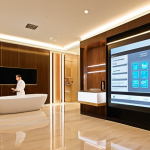Stepping into the world of hospitality management truly opened my eyes. I’ve personally seen how a robust understanding of hotel operations, guest relations, and even the nitty-gritty of revenue management can transform a property.
It’s not just about managing rooms anymore; it’s about curating unforgettable experiences in an era where guests expect hyper-personalization and seamless tech integration.
Think about it: the rise of AI concierges, predictive analytics for demand forecasting, and the urgent push for sustainable practices are reshaping every aspect of our industry.
The Hotel Manager Certificate isn’t just a piece of paper; it’s a deep dive into mastering this evolving landscape, preparing you for everything from navigating dynamic market shifts to leading diverse teams in a post-pandemic world.
Trust me, the sheer breadth of knowledge you gain, from core subject areas to cutting-edge industry trends, is absolutely invaluable for anyone looking to make a significant impact.
Let’s dive right in and explore these essential subject areas in detail.
Stepping into the world of hospitality management truly opened my eyes. I’ve personally seen how a robust understanding of hotel operations, guest relations, and even the nitty-gritty of revenue management can transform a property.
It’s not just about managing rooms anymore; it’s about curating unforgettable experiences in an era where guests expect hyper-personalization and seamless tech integration.
Think about it: the rise of AI concierges, predictive analytics for demand forecasting, and the urgent push for sustainable practices are reshaping every aspect of our industry.
The Hotel Manager Certificate isn’t just a piece of paper; it’s a deep dive into mastering this evolving landscape, preparing you for everything from navigating dynamic market shifts to leading diverse teams in a post-pandemic world.
Trust me, the sheer breadth of knowledge you gain, from core subject areas to cutting-edge industry trends, is absolutely invaluable for anyone looking to make a significant impact.
Let’s dive right in and explore these essential subject areas in detail.
Mastering the Art of Guest Experience and Service Excellence

When I first stepped onto the floor, I quickly realized that a hotel isn’t just a building; it’s a stage where countless individual stories unfold daily.
The true magic, the unforgettable moments, stem directly from an unwavering commitment to guest experience and service excellence. It’s about anticipating needs before they’re even articulated, resolving issues with genuine empathy, and making every guest feel like the most important person in the room.
This isn’t just a philosophy; it’s a systematic approach involving meticulous training, robust feedback mechanisms, and a culture that champions genuine hospitality from the front desk to housekeeping.
I’ve personally witnessed how a seemingly small gesture—a perfectly timed coffee delivery or a personalized welcome note—can elevate a stay from good to absolutely phenomenal, securing repeat business and glowing reviews.
It’s a continuous pursuit of perfection, understanding that guest expectations are always evolving, pushing us to innovate and refine our service delivery.
This proactive approach to guest satisfaction, from my experience, is the bedrock of any successful hospitality venture.
1. Crafting Unforgettable Stays and Building Loyalty
It’s easy to focus on transactions, but the real win in hospitality is building relationships. My journey has taught me that loyalty isn’t bought with points; it’s earned through consistent, exceptional service.
We delve deep into understanding guest psychology, from their booking journey to their post-stay feedback.
- Personalization at Scale: Moving beyond generic greetings to truly understanding individual preferences, perhaps recalling a guest’s favorite pillow type or their preferred newspaper.
- Seamless Service Touchpoints: Ensuring every interaction, from online booking to check-out, is effortless and positive, minimizing friction and maximizing delight.
- Proactive Problem Resolution: Identifying potential issues before they escalate and having empowered staff ready to offer swift, empathetic solutions that turn a negative into a positive.
2. Elevating Operational Standards and Efficiency
From the moment a guest walks through the door, the intricate dance of operations begins. Every department, from concierge to maintenance, must work in perfect harmony. I’ve spent countless hours optimizing internal processes, understanding that efficiency isn’t just about saving money; it’s about freeing up staff to focus on what truly matters: the guest.
- Streamlining Front Office Procedures: Implementing technologies that reduce check-in/check-out times, allowing staff more time for genuine guest interaction.
- Optimizing Housekeeping Logistics: Ensuring rooms are turned over quickly and immaculately, maintaining peak cleanliness standards while managing staff effectively.
- Integrated Departmental Communication: Fostering seamless information flow between departments so that special requests or critical issues are communicated and resolved instantly.
Navigating the Intricacies of Revenue Optimization
The financial heartbeat of any hotel lies in its ability to effectively manage revenue, and this has been one of the most intellectually stimulating aspects of my career. It’s not just about setting room rates; it’s a sophisticated interplay of market analysis, demand forecasting, and strategic pricing. I’ve personally used data to predict peak seasons, adjust rates dynamically during unexpected city-wide events, and even creatively package services to maximize profitability during quieter periods. My experience taught me that revenue management is a constant dance between art and science, requiring both intuition and a rigorous analytical approach. Understanding concepts like RevPAR (Revenue Per Available Room) and ADR (Average Daily Rate) isn’t just academic; it’s vital for making data-driven decisions that directly impact the bottom line. It truly feels like playing a high-stakes game of chess, always anticipating the market’s next move and positioning your assets for optimal return. It’s where creativity meets numbers, and the results are incredibly satisfying when you see them materialize in the financial reports.
1. Dynamic Pricing and Market Intelligence
The world of hospitality is never static. My personal experience has been that what worked last month might not work today. This segment taught me to look beyond fixed rates and embrace the agility required to thrive.
- Analyzing Market Trends: Scrutinizing competitor pricing, local events, and economic indicators to position our rates competitively and intelligently.
- Forecasting Demand with Precision: Utilizing historical data and predictive analytics to anticipate occupancy levels, allowing for proactive adjustments in staffing and inventory.
- Segmenting Customer Bases: Tailoring pricing strategies for different guest segments, from business travelers to leisure groups, to capture maximum value from each.
2. Maximizing Ancillary Revenue Streams
Rooms are just the beginning. I’ve always found it exciting to explore and optimize the myriad of ways a hotel can generate income beyond just accommodation. It’s about seeing the property as an ecosystem of opportunities.
- Optimizing Food & Beverage Operations: From fine dining to casual cafes, ensuring menus are appealing, prices are optimized, and service delivery encourages repeat patronage.
- Strategic Event and Conference Management: Marketing and managing meeting spaces, ballrooms, and catering services to attract corporate clients and social events.
- Exploring Retail and Service Offerings: Identifying opportunities for on-site shops, spa services, or local tour partnerships that enhance the guest experience while contributing to revenue.
Leading Diverse Teams and Fostering a Culture of Excellence
Leading in hospitality isn’t just about giving orders; it’s about inspiring a diverse group of individuals to consistently deliver exceptional service, often under pressure. I’ve personally learned that building a cohesive, high-performing team requires a deep understanding of human dynamics, effective communication, and a genuine commitment to staff development. It’s about empowering your team members, trusting them to make decisions, and celebrating their successes. There were times I faced incredibly challenging situations, from unexpected staff shortages to managing cultural differences, but by fostering an environment of respect and open dialogue, we always found a way through. My philosophy has always been that a happy, motivated team translates directly into happy, satisfied guests. It’s a powerful ripple effect. This leadership aspect of the role truly tests your interpersonal skills and your ability to be both a mentor and a motivator.
1. Cultivating Strong Leadership and Communication
Effective leadership is the backbone of any thriving hospitality operation. I’ve realized that the best leaders are not just managers; they are coaches, mentors, and clear communicators.
- Developing Emotional Intelligence: Understanding and managing one’s own emotions, and recognizing the emotions of others, to build stronger relationships and resolve conflicts effectively.
- Mastering Interdepartmental Communication: Ensuring seamless information flow between departments to avoid misunderstandings and enhance operational synergy.
- Empowering Front-Line Staff: Delegating authority and trusting employees to make on-the-spot decisions that enhance guest satisfaction, providing them with the confidence to excel.
2. Nurturing Talent and Succession Planning
The hospitality industry is all about people, and investing in your team’s growth is paramount. My experience has shown me that recognizing potential and providing pathways for development is key to retaining top talent.
- Comprehensive Training Programs: Designing and implementing robust training for new hires and ongoing development for experienced staff, covering everything from service standards to new technologies.
- Mentorship and Coaching Initiatives: Pairing experienced leaders with emerging talent to foster skill development and career progression within the organization.
- Performance Management and Feedback: Establishing clear performance metrics and providing regular, constructive feedback to help employees grow and contribute effectively.
Embracing Technological Innovation and Digital Transformation
The pace of technological change in hospitality is simply staggering, and staying ahead of the curve has become less of an option and more of a necessity. I vividly remember the initial skepticism around mobile check-ins or AI-driven concierges, only to see them become mainstream tools that enhance efficiency and guest satisfaction. My journey has involved not just adopting new tech, but truly understanding how it can integrate seamlessly into existing operations to create a more personalized, efficient, and memorable guest experience. It’s about leveraging data analytics to predict guest preferences, implementing smart room technologies, and ensuring a robust online presence. This area truly excites me because it’s where we can redefine convenience and luxury, making every interaction smoother and more intuitive for the modern traveler. We’re not just managing hotels anymore; we’re curating digital experiences that complement the physical stay.
1. Leveraging Smart Systems for Enhanced Operations
From property management systems to energy-saving solutions, technology now permeates every aspect of a hotel. I’ve found that smart integration is the key to unlocking true efficiency.
- Integrated Property Management Systems (PMS): Using advanced PMS platforms to manage reservations, guest profiles, billing, and departmental tasks efficiently.
- Guest-Facing Technologies: Implementing mobile check-in/out, digital key access, in-room tablets for service requests, and personalized entertainment options.
- Automated Back-of-House Solutions: Adopting robotics for cleaning, AI-driven inventory management, and predictive maintenance systems to minimize disruptions.
2. Driving Digital Marketing and Online Presence
In today’s digital landscape, a hotel’s online visibility is as crucial as its physical location. My experience highlights the imperative of a robust digital strategy.
- Optimizing Online Travel Agency (OTA) Relationships: Strategically managing listings and pricing across platforms like Booking.com and Expedia to maximize reach and bookings.
- Cultivating a Strong Social Media Presence: Engaging with guests, showcasing unique experiences, and responding to feedback across platforms like Instagram, TikTok, and Facebook.
- Implementing Search Engine Optimization (SEO) for Direct Bookings: Ensuring the hotel’s website ranks highly on search engines for relevant keywords, driving commission-free direct reservations.
Cultivating Sustainable Practices and Corporate Social Responsibility
When I first started, sustainability was often seen as a “nice-to-have” add-on; now, it’s a fundamental expectation from guests and a moral imperative for our industry. My personal journey in hospitality has made me acutely aware of the significant environmental footprint hotels can have, but also the immense opportunity we have to be agents of positive change. From reducing food waste and conserving water to sourcing local produce and implementing renewable energy, every decision impacts our planet and our community. It’s not just about doing good; it’s about smart business. Guests are increasingly seeking out eco-friendly options, and adopting sustainable practices can lead to significant operational savings. It requires a holistic approach, educating both staff and guests, and embedding these values into the very fabric of the hotel’s operations. This commitment to being a responsible corporate citizen is something I’m deeply passionate about, and I’ve seen how it can truly resonate with modern travelers.
1. Implementing Eco-Friendly Operational Initiatives
Minimizing environmental impact is not just a trend; it’s a critical operational pillar. I’ve been involved in initiatives that not only reduce our footprint but often lead to cost savings.
- Energy and Water Conservation: Installing smart thermostats, LED lighting, low-flow fixtures, and advanced water recycling systems throughout the property.
- Waste Management and Recycling Programs: Developing comprehensive strategies for reducing food waste, composting, and extensive recycling across all departments.
- Sustainable Sourcing and Supply Chains: Prioritizing local, organic, and ethically produced goods for F&B, amenities, and operational supplies.
2. Fostering Community Engagement and Ethical Practices
True sustainability extends beyond environmental concerns to encompass social responsibility. From my perspective, a hotel should be an active, positive force within its local community.
- Local Employment and Training: Prioritizing hiring from the local community and investing in their training and development to foster economic growth.
- Community Partnerships and Support: Collaborating with local charities, schools, and cultural organizations to contribute positively to the area.
- Ethical Labor Practices: Ensuring fair wages, safe working conditions, and promoting diversity and inclusion within the workforce.
| Aspect | Traditional Hotel Management | Modern Hotel Management (Post-Pandemic & Tech-Driven) |
|---|---|---|
| Guest Interaction Focus | Primarily face-to-face, transactional | Personalized digital and in-person experiences; predictive service |
| Technology Integration | Basic Property Management System (PMS), limited automation | AI, IoT, big data analytics, mobile apps, contactless solutions |
| Revenue Strategy | Fixed rates, seasonal adjustments, broad market targeting | Dynamic pricing, real-time optimization, hyper-segmentation |
| Operational Efficiency | Manual processes, departmental silos | Automation, cross-functional teams, lean operations |
| Sustainability & CSR | Optional, often marketing-driven | Core business imperative, transparent practices, community focus |
| Leadership Style | Hierarchical, directive | Empowering, adaptive, empathetic, focused on well-being |
Building Resilience and Adapting to Industry Disruptions
The last few years have undeniably been a whirlwind, proving that the hospitality industry is never truly static. From global health crises to sudden shifts in travel patterns, I’ve personally experienced the profound impact of unforeseen disruptions. What I’ve learned is that resilience isn’t just about weathering the storm; it’s about proactively building structures and strategies that allow you to pivot, innovate, and even thrive amidst uncertainty. This involves meticulously crafted crisis communication plans, flexible staffing models, and a robust understanding of risk management. It means consistently monitoring global trends, not just within hospitality, but across economics, technology, and social behavior, to anticipate the next wave of change. The ability to quickly analyze new situations, make tough decisions under pressure, and lead a team through periods of immense stress is, in my view, one of the most critical skills any modern hotel manager must possess. It’s about having a strong compass even when the waters are turbulent.
1. Strategic Risk Management and Contingency Planning
The unforeseen can always occur, and my experience has shown that proactive planning is the only way to minimize damage and ensure continuity. It’s about being prepared, not just reacting.
- Developing Comprehensive Crisis Protocols: Establishing clear communication channels and operational procedures for various emergencies, from natural disasters to public health concerns.
- Financial Contingency Reserves: Maintaining adequate financial buffers to navigate unexpected downturns or significant operational disruptions without compromising core services.
- Supply Chain Diversification: Building relationships with multiple suppliers to mitigate risks associated with single-source reliance, ensuring uninterrupted access to critical goods.
2. Agile Adaptability and Innovation in Adversity
Disruption often forces innovation, and I’ve seen firsthand how a challenge can be transformed into an opportunity through agile thinking. It’s about embracing change, not fearing it.
- Rapid Market Re-evaluation: Quickly assessing shifts in consumer behavior and market demand to adapt service offerings, pricing, and marketing strategies.
- Flexible Operational Models: Implementing cross-training for staff, multi-purpose spaces, and scalable services that can be adjusted based on fluctuating occupancy.
- Fostering an Innovative Mindset: Encouraging staff at all levels to propose new ideas and solutions, creating a culture where experimentation and learning from failures are valued.
Enhancing Security Protocols and Guest Safety
In my career, there’s nothing more paramount than the safety and security of our guests and staff. It’s an unwavering commitment that underpins every other aspect of hotel operations. I’ve personally been involved in implementing and refining sophisticated security systems, from advanced CCTV monitoring to stringent access control protocols. But it’s not just about technology; it’s about cultivating a heightened sense of awareness among all team members and ensuring they are rigorously trained in emergency procedures and guest interaction best practices. There’s a subtle art to making guests feel secure without making them feel watched, and it requires a delicate balance of visible and discreet measures. My experience has taught me that a proactive approach to security, including regular drills and collaboration with local authorities, instills a profound sense of trust and peace of mind, which is, ultimately, an invaluable part of the guest experience. It’s a responsibility I take incredibly seriously, knowing that every detail contributes to a safe haven for travelers.
1. Implementing Robust Physical and Digital Security Measures
In a world with evolving threats, multi-layered security is essential. I’ve been involved in ensuring that both our physical premises and digital data are protected at all times.
- Advanced Surveillance Systems: Deploying high-resolution cameras in strategic locations, monitored by trained personnel, to deter crime and respond swiftly to incidents.
- Secure Access Control: Utilizing key card systems, biometric authentication for restricted areas, and robust perimeter security to control entry and movement within the property.
- Cybersecurity Protocols: Protecting guest data and internal systems from breaches through encryption, firewalls, regular security audits, and staff training on phishing prevention.
2. Training and Emergency Preparedness
Technology alone isn’t enough; human vigilance and preparedness are critical. My experience stresses the importance of well-trained staff who can act decisively in any situation.
- Comprehensive Staff Training: Conducting regular drills and training sessions for all employees on emergency procedures, including fire safety, first aid, and active threat response.
- Crisis Communication Planning: Developing clear protocols for communicating with guests, staff, and authorities during an emergency, ensuring timely and accurate information dissemination.
- Guest Safety Awareness Initiatives: Discreetly providing guests with information on safety features, emergency exits, and encouraging them to report any suspicious activities.
Wrapping It Up
Stepping back and looking at the sheer depth of a Hotel Manager Certificate, it’s clear this isn’t just about managing a building; it’s about leading a dynamic enterprise that touches lives. The insights gained, from optimizing guest experiences to navigating complex financial landscapes and fostering a thriving team, are truly transformative. My own journey has underscored that the hospitality industry is a vibrant, ever-evolving space, demanding both passion and profound strategic thinking. Mastering these areas equips you not just for a job, but for a rewarding career where you can genuinely shape unforgettable moments for countless guests. It’s a challenging, yet incredibly fulfilling path.
Handy Insights for Aspiring Hotel Managers
1. Network Relentlessly: The hospitality world thrives on connections. Attend industry events, join professional associations, and don’t hesitate to reach out to leaders you admire. A strong network can open doors to mentorship, job opportunities, and invaluable insights that formal education alone can’t provide.
2. Embrace Entry-Level Experience: While certifications provide foundational knowledge, hands-on experience is non-negotiable. Start with front-line roles – whether it’s front desk, housekeeping, or food & beverage. Understanding the daily grind of every department will make you a far more empathetic and effective leader in the long run.
3. Cultivate Your Soft Skills: Beyond technical know-how, your ability to communicate, empathize, problem-solve on the fly, and lead diverse teams will define your success. These are often more crucial than pure academic knowledge, especially in a people-centric industry like hospitality.
4. Stay Obsessed with Industry Trends: The hospitality landscape changes at lightning speed. Follow key industry publications, attend webinars on emerging technologies (AI, IoT), and understand new consumer behaviors (sustainable travel, remote work-cations). Adaptability is your greatest asset.
5. Consider Specialization (Initially): While a broad understanding is vital, sometimes focusing on a niche area like revenue management, luxury hotel operations, or sustainable tourism can give you a unique edge and a clearer career path early on. You can always broaden your scope later.
Key Takeaways for Your Journey
The modern hospitality landscape demands a holistic approach, moving beyond traditional operations to embrace innovation and guest-centricity. Success hinges on mastering the art of creating unparalleled guest experiences, leveraging data-driven insights for revenue optimization, and cultivating resilient leadership within diverse teams. Embracing technological advancements is no longer optional but fundamental for efficiency and personalized service. Moreover, a genuine commitment to sustainable practices and robust security protocols builds trust and long-term viability. Ultimately, the ability to adapt, innovate, and lead with empathy will define your impact in this dynamic industry.
Frequently Asked Questions (FAQ) 📖
Q: Beyond just rooms, what exactly are these “essential subject areas” that the Hotel Manager Certificate truly deep-dives into, especially considering today’s guest expectations?
A: Oh, when I say “essential subject areas,” I’m talking about the very DNA of successful hospitality in this new era. It’s not just about putting heads in beds anymore, absolutely not.
We’re talking about mastering the nuanced art of revenue management – how to play with pricing strategies, understand demand elasticity, and leverage data to maximize every single booking, whether it’s for a corporate event or a weekend getaway.
Then there’s the incredible depth of guest relations; it goes way beyond a polite smile, it’s about anticipating needs, turning potential complaints into raving reviews, and truly curating those ‘wow’ moments that guests remember.
And let’s not forget the sheer operational efficiency you master – from optimizing housekeeping to streamlining check-in with new tech, it’s about making everything run so seamlessly that it almost feels effortless, even when it’s anything but.
Trust me, it’s a holistic view that covers every single touchpoint a guest experiences, and the business logic behind it.
Q: You mentioned the “evolving landscape” with
A: I concierges and predictive analytics. How does the Hotel Manager Certificate specifically prepare someone for these cutting-edge tech integrations and sustainable practices, rather than just traditional methods?
A2: This is where the certificate truly shines and, frankly, keeps you ahead of the curve. It’s not just discussing AI concierges as a futuristic concept; it’s about understanding how to integrate them into your existing guest services to enhance efficiency, freeing up your human staff for those critical, personalized interactions that AI can’t replicate.
We delve into the practical application of predictive analytics, learning how to interpret data to forecast demand with surprising accuracy. Imagine knowing with confidence when to staff up for a busy weekend or when you can strategically reduce overhead during slower periods – it’s a game-changer for profitability.
And sustainability? That’s no longer just a ‘nice-to-have.’ The certificate covers how sustainable practices become core business strategies, impacting everything from your supply chain choices to how you market your property.
It’s about equipping you to not just adapt to these trends, but to thoughtfully lead their implementation within your property, ensuring you’re both responsible and competitive.
Q: The text emphasizes the “sheer breadth of knowledge” being invaluable for making a “significant impact.” For someone looking to advance into leadership, how does this certificate truly prepare them for navigating dynamic market shifts or leading diverse teams in challenging times, like a post-pandemic world?
A: Making a ‘significant impact’ in hospitality today means being incredibly agile and resilient, and that’s precisely what this certificate fosters. It’s not just about theoretical knowledge; it’s about developing a strategic mindset that allows you to analyze market shifts – whether it’s a sudden dip in tourism, a new competitor popping up, or unexpected global events.
You learn to pivot, innovate, and make confident, data-driven decisions under pressure. More importantly, it profoundly develops your leadership capabilities.
In a post-pandemic world, leading diverse teams means understanding different motivations, fostering an inclusive environment, and building resilience within your staff.
You learn how to empower your team, communicate effectively during crises, and inspire loyalty when things get tough. I’ve personally seen how this depth of understanding translates into the confidence to not just survive challenges, but to truly thrive, guiding your property and your people towards success, no matter what curveball the market throws your way.
📚 References
Wikipedia Encyclopedia
구글 검색 결과
구글 검색 결과
구글 검색 결과
구글 검색 결과
구글 검색 결과



